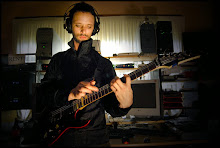Week 12 Improvisation Workshop 26-10-06:
Week 12 Improvisation Workshop 26-10-06:

David Harris and the power of 7/8:
The diminishing group of would be improvisers were treated to some one on six tuition from David Harris this week. A suggestion of a drum loop in 7/8 was the order of the day here. The first attempt was a dismal failure, as no one seemed to be able to hold time with the subtle high hats emanating from jakes computer. With a little tweaking, he managed to give us some rock solid 7/8 foundation by breaking the bar into two distinct sections; one phrase of 4/4, and one phrase of ¾, accented accordingly. With some straightforward chord stabbing from Harris on the piano, we soon got the hang of it. This went on for a while at a reasonable tempo and some interesting results sprang forth. It wasn’t until Jake dropped the tempo back to around half that it started to really funk along. I’m usually shy about improvising in odd time signatures, but this approach seemed to alleviate some of my reservedness.
David’s live musical input was often of the avant-garde variety, spilling numerous clusters of discordant notes from the piano, and also giving us the root chord or note from time to time, which helped a lot with my personal contribution to the mix. I found David’s approach encouraged me to explore some odd scales and play at little off centre from time to time. I find this approach fun in small doses, but it doesn’t take long before I instinctively regress to what I know and love, that being minor, Phrygian and pentatonic scales – plus dive bombs of course.
The group as a whole seemed to be less inspired than last week, perhaps due to the fact that exams and assignments are beginning to close in. I’m looking forward to the performance regardless, and I believe everything will come together on the night.
Reference:
Stephen Whittington and David Harris. ‘Improvisation workshop’. Workshop presented at Studio 5, 5th Floor, Schulz Building, University of Adelaide, 26th October, 2006.
Week 11 Workshop on performance 19-10-06:
Week 11 Workshop on performance 19-10-06:
It’s one oclock in the morning and I’m well overcome with Omnigraffle madness. I’m happy to say I have some sort of plan to work with for the performance, I spent the last couple of hours maxing out the K5000 so I can go on a twiddling frenzy – that should get the crowd reved up. All I need to do now is work out how I’m going to fast track my motor skills so the performance doesn’t take six hours instead of eight minutes…
Below is the above mentioned Omnigraffle screenshot, along with my Plogue spagetti nightmare for the week.
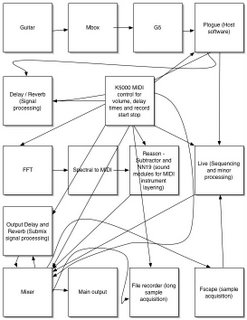
What is an Omnigiraffe anyway? A gifaffe with two heads perhaps?
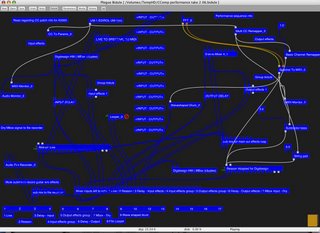
It's all fun and games until someone loses an ear...

A timely message for every self important instrumentalist:

Week 11 Improvisation Workshop 19th October 2006:
Week 11 Improvisation Workshop 19th October 2006:

This new look should disperse those 'poser' rumors...
At the very least, this was a one hundred percent improvement on last week’s session. All it really took was a little communication before the start of each jam, and some diplomatic leadership from Ben, which served to keep us aware of the overall sound.
Much credit should go to Jacob this week for keeping the rhythm tight and interesting. His ‘on the fly’ skills are improving rapidly.
There were a couple of interesting ‘lead war’ moments between myself and Matt. It’s always fun to have someone to bounce melodic ideas to and fro with. A bit of EQ tweaking gave Adrian’s bass some nicely rounded bottom end which filled out the mix nicely in the second half. This session really started to rock towards the end, when it was cruelly cut short. I’m looking forward to next week…
Renegades of Funk (8.3 Mb Mp3)Reference:
Stephen Whittington and David Harris. ‘Improvisation workshop’. Workshop presented at Studio 5, 5th Floor, Schulz Building, University of Adelaide, 19th October, 2006.
Week 11 Forum 19th October 2006:
Week 11 Forum 19th October 2006:
Luke Harrold:
It was refreshing to have another artist talk for a change. Luke was a confident and interesting person to listen to. I would have had a more difficult time imagining what his experience at
NIME 06 was like, had I not recently attended the
ACMC conference here in Adelaide. It sounded like a very similar environment by comparison, just on a larger scale with a bigger budget of course.

In particular, I was very interested in the performance footage of
Adachi Tomomi, who seemed to really be at the cutting edge of his craft. I am planning to explore the art of electronic sound control via real-time body movements myself over the next few years. There was a similar performance at this years ACMC conference, but it was ambient and hypnotic, rather than the excited gyrating and eccentricity offered by Tomomi.
I found it hard to imagine what a snare drum controlled by a piezo might sound like (
Juan Cristonal Cerillo), but I could surmise a sonic picture of the ‘earthquake’ installation (
Jean Francois Laporte) which was a brilliant, but I imagine highly expensive, concept for a sound installation. Luke seems to have luck on his side this year, receiving no less than three grants toward his PHD studies, which have enabled him to pursue this European experience of music technology. His presentation certainly gave an insight into where our studies at
EMU can take us. I wonder if I’ll be able to secure a $150,000 grant to study at the
GIT in the USA when I graduate…
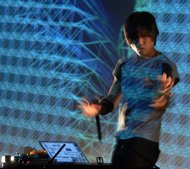 Adachi Tomomi example (1.43 Mb .Wav file)
Adachi Tomomi example (1.43 Mb .Wav file)Reference:
Luke Harrold. ‘Artist Presentation – NIME 06’. Artist talk presented at EMU space, 5th Floor, Schulz Building, University of Adelaide, 19th October, 2006.
Week 11 – Audio Arts – Doppler 17th October 2006
Week 11 – Audio Arts – Doppler:
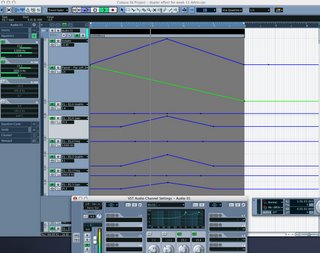
This was a straightforward enough task. Boosting the gain and Q of the frequency parameters above 2000Hz increasingly over time seems to be the go. The peak frequency for the given Eq range should be left alone to avoid a synthetic effect however.
I have a slight issue with Cuebase and its audio editing interface. There is no separation line between the effect automation tracks, making it difficult to determine which is which. As you can see from the image, it creates a kind of grey wallpaper, with the automation ramps painted on top. There is probably a way around this – time will tell I’m sure…
The mighty Doppler (1.7Mb Mp3)Reference:
Christian Haines. ‘Audio Arts – Spatial sound processing’. Lecture presented at the Audio Lab, 4th floor, and EMU Space, 5th Floor, Schulz building, University of Adelaide. 17th October 2006.
Wk 10 Creative Computing 12th October 2006
Wk 10 Creative Computing 12th October 2006:
Midi Control freak:
Ahh MIDI, now I’m in my comfort zone. No trigonometry, no drain on the processor, why did we ever move on from 1983? Things would be so much easier, and whole cities would still be built on rock and roll…
Everything went according to plan with this exercise. The only glitch was that I neglected to note down the ‘velocity scaler’ as an all-important tool, in the construction of a credibly useable MIDI delay. I successfully managed to get some parameter tweaking happening with the K5000 control thingy. It appears to be a handy little unit, I may incorporate its functionality into my performance piece, time will tell. Check out the patch and audio files (especially the particle arpeggiator file – it’s scary!), it’s not as complicated as the pictures make it seem at first glance…
Bidule patch (0.224Mb .bidule file)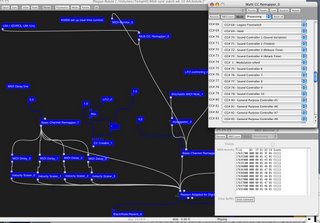



My personal favourite...
Reference:
Christian Haines. ‘Creative Computing - Reason, Bidule, Rewire and Midi Connections’. Lecture presented at the Audio Lab, 4th floor, Schulz building, University of Adelaide. 12th October 2006.
Week 10 Audio Arts 10th October 2006
Week 10 Audio Arts 10th October 2006:
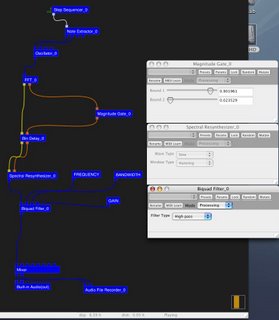 Working on water:
Working on water:After piecing together various tomes of information on FFT and water-like sound synthesis, I have another mediocre result to offer. The computer was a little adverse to anything other than the most extreme difference in bound parameter change at the magnitude gate when resynthesising the white noise (I had the processor up to 207% there at one point – only a Macintosh could come up with such a ridiculous figure, at least my PC would have had the courtesy to just crash, instead of complaining about doing some hard work).
Anyhow, I refer you to the files below. There are two audio files – one without the ‘bin delay’ and one with.
Water synthesis without bin delay (0.168Mb Mp3)With bin delay (0.168Mb Mp3)Plogue Patch (0.036Mb .bidule file)Reference:
Christian Haines. ‘Audio Arts – Spectral analysis and FFT’. Lecture presented at the Audio Lab, 4th floor, Schulz building, University of Adelaide. 10th October 2006.
Improvisation Workshop Week 10 12th October 2006
Improvisation Workshop Week 10 12th October 2006:

Dont ask me why.
Today’s jam certainly took me by surprise. Whoever the other David Dowling is at this university, he must have had a funny look on his face when reading the e-mail that was meant for me. Perhaps it was the surprise factor and the lack of associated anticipation that would go hand in hand with awareness, but I felt the session was a little flat. There was no issue with patching studio five and getting everyone playing, but too many of us seemed reluctant to settle on an idea, or a specific sound source.
Another issue with these jams arises when everyone sticks to a simple riff for too long (I am probably the worst offender in this category), and it becomes difficult for anyone to change the momentum or direction, such as the key for instance. We seem to become glued in the one spot, with no one willing to take the initiative to make something workable into something really interesting. Towards the end of the session, to his credit, Dragos tried to pull this off, but by that stage everyone was in their own little world and failed to notice.
I’m not sure if it really was just not knowing beforehand that this is what we were going to do today, or if it was the absence of the influential DJ Tr!p, who served to make our groups sound really come alive last week. I may be on to something here, perhaps our group is too large for people to be absorbed in doing their own thing (it can become a real ‘wall’ of sound at times). Maybe we need a leader, or conductor of sorts, to let us know when our own personal contribution is giving too much or too little. There was certainly a lot of this energy coming from Tr!p last week, as he tentatively coaxed a preferable performance out of those nearest to him (myself included), with looks of either encouragement or puzzlement, but never outright dissatisfaction.
It’s funny, the presence of a solid rhythm track should really help us come together and play as a unit (it certainly did last week), but today I felt it rendered us a little stagnant. There were still some good moments, but I know we can be more consistent and do better. Next Thursday’s session awaits, I shall meditate and fast for seven days in preperation.
Here is a sample of an inspiring moment (1.1Mb Mp3)Reference:
Stephen Whittington. “Improvisation Workshop”. (Lecture presented at EMU Space and Studio Five 5th floor Schulz building, University of Adelaide). 12 October, 2006.
Creative Computing Wk 9 Open Sound Control – 05/10/06
Creative Computing Wk 9 Open Sound Control – 05/10/06:

Finally, a Plogue Bidule task that works with minimal headaches. After some quick revision, Ben and I managed to get computers 1 and 2 communicating without crashing. The ‘jam’ session that followed was as much about fighting for parameter control as it was about making music. I think the virtual violence has created some interesting results. Things were kept simple; only the voweler and reverb effects had their parameters sadistically attenuated, but as they say, restriction provokes expression…
That’s my fader..no its mine…give it back….hey..what….nooooo! (128Kb Mp3)Plogue patch for those in the know
Audio Arts Wk 9 Tone Wheel Patch (Sem 2)
Audio Arts Week 9 Sem 2 - 03/10/2006:
Tone Wheel Emulation:
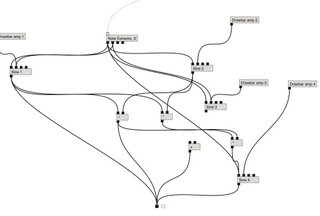
This is my Hammond organ patch – the source of one Friday’s worth of frustration. According to the placement and functionality of each binary operator, it should be giving me the fundamental, the 2nd and fourth harmonics (the third was beyond my capabilities of reproducing). In reality it seems to be doing something a little more twisted. However, it does have an organ quality of sorts, so after five hours I’ve decided to leave it there…
On second thought, after some generous tuition from the multiskilled Luke Digance, I have now come up with this:
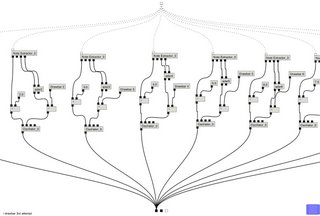 Go the tone wheel (28Kb Mp3)
Go the tone wheel (28Kb Mp3)
Improvisation Workshop Week 9 – 05/10/2006
 Improvisation Workshop Week 9 – 05/10/2006:
Improvisation Workshop Week 9 – 05/10/2006:Tyson Hopprich aka;
Dj Tr!p:
Way back in the nineties I had the pleasure of studying alongside DJ Tr!p at the now defunct Flinders St School of Music. Whilst I had my reservations about his sometimes eccentric behavior at first (I was still a practicing narrow minded bogan in those days – minus the mullet; baby steps now), I soon found his limitless enthusiasm and energy infectious. I think he may have had a significant indirect influence in building my confidence as a composer. I certainly don’t think I’m an accomplished composer now, nor have I been in the past, but seeing Tyson really going for it, and consistently putting himself out there, encouraged me to do the same. Now if only I wasn’t so afraid of dancing…
There were many highpoints of today’s session. The first was achieved before most people showed up and some of the improv’ group had a laid back jam with Tr!p to warm up. Isn’t it funny how you always play your best chops at the sound check? Curse my mortal non electro-bionic body parts.
The second was definitely Tyson’s short game-boy set, in which he introduced the uninitiated to his world of composing through restrictive mediums. Interesting, an electronic musician who is adverse to embracing new technology if avoidable, yet who is still successful – there may be hope for me yet…
Thirdly, I was impressed the second time we jammed together as a group for the audience. The laid back trip-hop groove set down by Tyson gave me just the tempo I needed to sneak in some syrupy blues wah-wah licks on occasion, while kicking back with the rhythm section in others. I took note of Tr!p’s advice to remain aware of the audience, and tried not to cut through the mix too often (apologies to the undoubtedly disappointed
J D Delaney for my restraint, but the performance was not all mine).
The following session seemed to be the big crowd pleaser (well it would have been if we had a big crowd). Tr!p inquired of the group as to whether or not a rise in tempo was the order of the day. The answer was yes and his timing couldn’t be better. The tight punchy rhythm dragged me kicking and screaming out of bluesman mode and forced some good old fashioned hard rock riffage, the likes of which AC/DC’s Malcolm Young would be proud.
Throughout the sessions, the waterfall of some wonderfully tasteful piano scale runs decorated the melodies and sound effects on offer, courtesy of
Matt Mazzone.
Dragos Nastasie kept the sustained harmonies flowing from the mighty Juno 2.
Ben Probert provided some notably tentative vocal textures due to the failure of his security pedal which, in hindsight were probably more appropriate than the “raise your hands in the air like you just don’t care” material that we all know he had secretly planned to inflict upon the occasion.
Jacob Morris kept things interesting with some serious sample mashing in Ableton Live. Most restrained of the group were
Albert Webster, whose contribution was too obscured in the mix from where I was placed for me to be able to offer comment on, and
Adrian Reid. Adrian was manipulating a signal from a microphone placed in front of my guitar amp. He deserves full credit for his contribution, although it was severely restricted to those moments when I was playing at a significant volume (which were uncharacteristically few). There were occasions when I could hear the output of my amp blending brilliantly with the Supercollided enhancement from Adrian’s Laptop.
All in all, another great afternoon at EMU, but don’t take my word for it listen for yourself:
Tr!p-tendo jam - DJ Tr!p only (8.5 Mb Mp3)Tr!p-hop jam – Whole group 2nd time (15.3 Mb Mp3)Tr!p-rock jam – Whole group 3rd time (11 Mb Mp3)My apologies for the large size of these sound files, but they are six, eleven and eight minutes long respectively.
Anyone who wants a copy can see me, as I will keep them on my hard drive.
These files were recorded at high resolution by Ben Probert with a microphone linked to studio one, so the audio quality is substantially better than the voice recorder files I usually blog.
Reference:
Tyson Hopprich. “Improvisation Workshop”. Lecture presented at EMU Space, 5th Floor, Schultz Building, University of Adelaide. 05 October 2006.



















